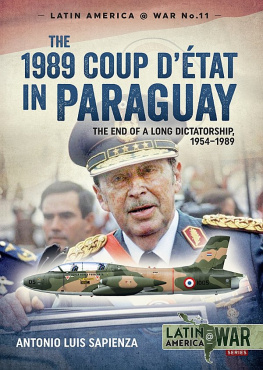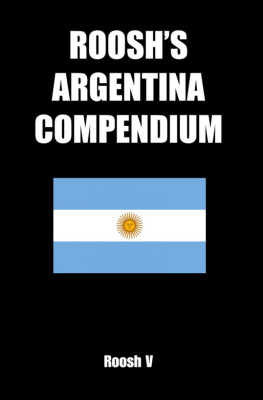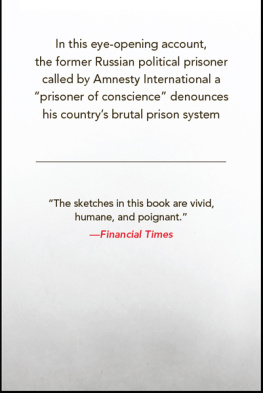The Reappeared
Genocide, Political Violence, Human Rights Series
Edited by Alexander Laban Hinton, Stephen Eric Bronner, and Nela Navarro
Alan W. Clarke, Rendition to Torture
Lawrence Davidson, Cultural Genocide
Daniel Feierstein, Genocide as Social Practice: Reorganizing Society under the Nazis and Argentinas Military Juntas
Alexander Laban Hinton, ed., Transitional Justice: Global Mechanisms and Local Realities after Genocide and Mass Violence
Alexander Laban Hinton, Thomas La Pointe, and Douglas Irvin-Erickson, eds., Hidden Genocides: Power, Knowledge, Memory
Walter Richmond, The Circassian Genocide
Irina Silber, Everyday Revolutionaries: Gender, Violence, and Disillusionment in Postwar El Salvador
Samuel Totten and Rafiki Ubaldo, eds., We Cannot Forget: Interviews with Survivors of the 1994 Genocide in Rwanda
Ronnie Yimsut, Facing the Khmer Rouge: A Cambodian Journey
Library of Congress Cataloging-in-Publication Data
Park, Rebekah
The reappeared : Argentine former political prisoners / Rebekah Park.
pages cm.(Genocide, political violence, human rights series)
Includes bibliographical references and index.
ISBN 9780-813568553 (hardcover : alk. paper)ISBN 9780-813568546 (pbk. : alk. paper)ISBN 9780-813568560 (e-book)
1. Political prisonersArgentinaHistory. 2. State-sponsored terrorismArgentinaHistory. 3. Government, Resistance toArgentinaHistory20th century. 4. ArgentinaPolitics and government19551983. I. Title.
HV9582.P37 2014
365.'4500982dc23
2013046605
A British Cataloging-in-Publication record for this book is available from the British Library.
Copyright 2014 by Rebekah Park
All rights reserved
No part of this book may be reproduced or utilized in any form or by any means, electronic or mechanical, or by any information storage and retrieval system, without written permission from the publisher. Please contact Rutgers University Press, 106 Somerset Street, New Brunswick, NJ 08901. The only exception to this prohibition is fair use as defined by U.S. copyright law.
Visit our website: http://rutgerspress.rutgers.edu.
Without the help of many agencies and individuals, this project would not have been possible.
For funding this research, I am deeply grateful to the Jacob K. Javits Fellowship Program, the Pacific Rim Research Program, and the Department of Anthropology at the University of California, Los Angeles (UCLA). The UCLA Center for the Study of Women also provided institutional support and library privileges.
I began working with former political prisoners in Argentina at the urging of Dr. Irene Martnez, a physician, writer, and human rights activist (and herself an ex-presa poltica or former political prisoner). Irene introduced me to her compaeros, or comrades; her fiery spirit and sense of humor continue to be an inspiration. For her wisdom, strength, and mentorship, I thank Sara Liliana Waitman, who, as president of the Asociacion de Ex-Presos Polticos de Crdoba (Association of Former Political Prisoners of Crdoba, or AEPPC) (20082011), took me under her wing and became my key informant. Juan Carlos lvarez, Ester Cabral, lida Ely Eichenberger, Mario Paredes, and Gladys Regalado all provided invaluable support, guidance, and friendship, and answered an endless stream of questions.
None of this would have been possible without the ex-presos themselves. All of the members of the AEPPC welcomed this foreign scholar, sharing mate (herbal tea) and their stories. I witnessed their steadfast commitment to social justice. I would like to thank all of the following former political prisoners, the majority of which were formally interviewed: Luis Acosta, Fidel Antonio Alczar, Juan Carlos lvarez, Roque Jos Antonio Anguinetti, Mara Mercedes Chicha Aranguren de Scheurer, Jorge L. Caballo Argaaraz, Amrico Aspitia, Atilio Basso, Ester Cabral, Sebastin Cannizzo, Irma Casas, Miguel Carlos Miguelito Contreras, Flix Gato Cornejo, Cristina Correa, Gloria di Rienzo, Maria Cristina Diaz, lida Ely Eichenberger, Graciela Josephina Feliz, Hugo Luis Fernndez, Hugo Roque Ferradans, Vctor Eduardo Ferraro, Ovidio Ramn Pajarito Ferreyra, David Lanuscou, Stella Molina, Juan Morales, Silvia Martos, Manuel Nieva, Pedro Nolasco Gaetn, Rosa Noto, Rodolfo Petiso Novillo, Mario Paredes, Norma Peralta, Mara del Carmen Carmencita Prez, Jorge Villero Ramrez, Gladys Regalado, Enzo Gringo Sacco, Alicia Staps, Carlos Hugo Surez, Jorge Alfredo Torriglia, Adriana and Alicia Varillas, Viviana Vivi Vergara, Juan Villa, Sara Liliana Waitman, and Heldo Zrate.
Carole Browner, Linda Garro, Geoffrey Robinson, Susan Slyomovics, and Jason Throop all provided close readings and critical commentaries, as did two anonymous readers from Rutgers University Press. Carole supported this project from the start, and Susan gave me the language to write about political prisoners, museums, and reparations. Geoffrey and Jason provided very detailed comments on the theory and structure that were instrumental in shaping the final version of this book. Geoffrey helped me realize the most significant findings of my research.
Jena Barchas-Lichtenstein read and offered substantive and stylistic advice and very helpful edits; Hanna Garth, scar Gil-Garca, and Natasha Rivers all read versions of individual chapters. I also thank Marilyn Silverman for her meticulous copyediting. I thank Marlie Wasserman for planting the idea to publish my book with Rutgers University Press.
I thank two Argentine scholars, Ludmila da Silva Catela and Jaime Malamud-Goti, as experts on human rights in Argentina. A good portion of this fieldwork was conducted at the Provincial Commission and Archive of Memory of Crdoba, where Ludmila and her staff graciously let me hang around for hours on end.
Muchsimas gracias a los Argentinos Pamela Almada, Natacha Gonzlez Cendra, Carmen Herrera, Martn Llanos, and Alicia Ester Schiavoni, who all taught me the language and culture in Argentina in the way that only true friends can. Thank you for welcoming me into your homes.
My work with the Crdobese former political prisoners continued even after my return to the United States through Alicia Partnoy and Ana Deutsch; their quick reception and warmth were greatly appreciated, as well as their scholarly insights on their own personal experiences. I would like to thank Ram Natajaran, Eva Roekel, and Katja Seidel for being wonderful compaeros to collaborate with, and exchange ideas on Argentinas human rights scene.
Cricket Buchler, Abby Fifer-Mandell, Lauren Gutterman, David Lowenfeld, Sally Mendelsohn, Jeff Park, Barbara Sheen, Suzanne Wertheim, and Kristin Yarris generously gave me personal and moral support.
Finally, I must thank Jonah Lowenfeld, Ezekiel Agustn Lowenfeld, and Zooey Corina Lowenfeld. Everything in my life is better because of Jonah, and my children, who both sat patiently in my womb during the writing of this book.








